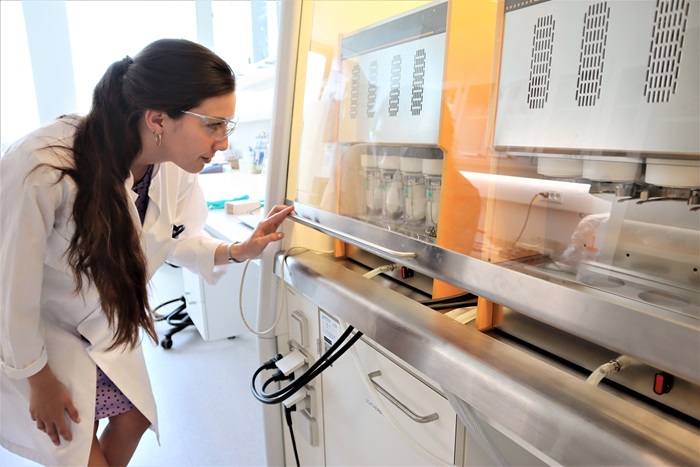Along with Novozymes, chemistry student Simone Anika Skou Olsen has been developing new methods for measuring detergent and other residues in our clothes. This can potentially minimise skin irritation and pollution from surfactants.
Even when clothes have been through a washing machine and smell clean, they still carry various residues. Besides grease and perspiration, some residues from surfactants such as the detergent’s soap and so-called anionic tensides are also not rinsed out by the wash water.
These anionic tensides can irritate the skin. To avoid future contact with them via our clothes, the ability to measure the precise quantity remaining after a wash is critical.
This is exactly what Simone Anika Skou Olsen, a graduate student in Applied Chemistry, has been investigating. She is just about to complete an MSc thesis that has involved daily sessions with Novozymes, the biotechnology solutions business.
“Using my knowledge to improve everyday products, from both the consumer and the environmental perspectives, has motivated me throughout my chemistry studies. Chemistry plays an important role in products we use every day; detergents for example. At Novozymes, because I’ve had access to lots of equipment and also had the opportunity to discuss things with experts from many of the company’s highly specialised departments, I've been able to make a detailed investigation of detergent residues.”
Lilian Tang Baltsen, Science Manager and Simone’s supervisor at Novozymes, relates that the company has gained new knowledge through the association with Simone.
“Measuring residues in laundry is difficult, but Simone has accomplished a fundamental piece of research and, at the same time, made a connection between various items of equipment and the departments’ competences. She has developed new procedures and tighter analysis methods. These are important for Novozymes’ continuing work with developing detergents that are skin and environment friendlier,” comments Lilian Tang Baltsen.
Data can help at a global level
Besides the ability to measure soap residues in clothes, the methods in Simone’s MSc thesis also provide a better data set as regards measuring the quantities and types of residues that clothes release into wash water in various conditions. Large quantities of anionic tensides are discharged along with this water. This is harmful for the environment, as many of them cannot then be broken down.
With offices all over the globe, Novozymes is a world leader in enzyme technology. Consequently, the measuring methods may become significant in solving problems in countries where wash water does not end up in a treatment plant.
“When someone in India has to throw tenside-containing wash water directly into a sewer or to wash clothes on a riverbank, the residues enter a local watercourse. There, they can form an enormous foam layer that can be up to several metres thick. This layer ‘shields’ the generation of natural swamp gases and the foam swirls deleteriously across the surroundings. The river’s aquatic environment is destroyed and the explosive gases that arise can lead to fires and toxic smoke,” states Lilian Tang Baltsen.
She continues: “To tackle such a problem, it is vital that we can thoroughly analyse detergent compositions and emissions. Simone’s MSc thesis contributes to this.”

Simone Anika Skou Olsen has used an extraction device at Novozymes to extract specific substances from textile samples. The substance of interest is dissolved from the textile sample with a solvent. Afterwards, the substance is separated from the solvent which is evaporated.
Company collaboration from start to finish
Throughout her studies, it was always on the cards that Simone would write her MSc thesis at Novozymes.
“In one of our first courses, ‘Engineering’, we visited lots of companies and were encouraged to build networks. Novozymes’ research facilities, green mission and focus on sustainability captured me. I contacted them about writing my BSc project. They agreed,” she reveals.
She explains that, while the collaboration with the company made it easy for her to be goal-oriented in choosing DTU courses, it would still have been easy to change direction along the way:
“DTU’s study options supported the direction I was taking. For example, I chose the ‘Colloids and Interfaces - Fundamentals and Applications’ course. This covered, amongst other things, tensides and gave me a basic insight into the use and design of a number of chemical products. Another course I also found very rewarding was ‘Chemical and Biochemical Product Design’. This introduced me to product innovation and general tools for organising and managing product design. I drew on these courses enormously in my work at Novozymes. Yet, at the same time, the courses were wide enough for me to be able to use them in many other connections if I’d wanted to shift focus.”
Besides doing her BSc and MSc work at Novozymes, Simone also had a student job and a fixed desk in the company’s Freshness office. This successful collaboration is now set to go even further. Simone has been offered a position on completion of her MSc thesis in July.
“When we collaborate with a student, we can give them deep insights into how we work and the company’s DNA. We found a really good match with Simone. As we generally experience with DTU students, she has been highly autonomous and imaginative. This is probably because DTU focuses keenly on usability. Their engineering students are also fantastic at meshing an operation’s gears,” concludes Lilian Tang Baltsen.